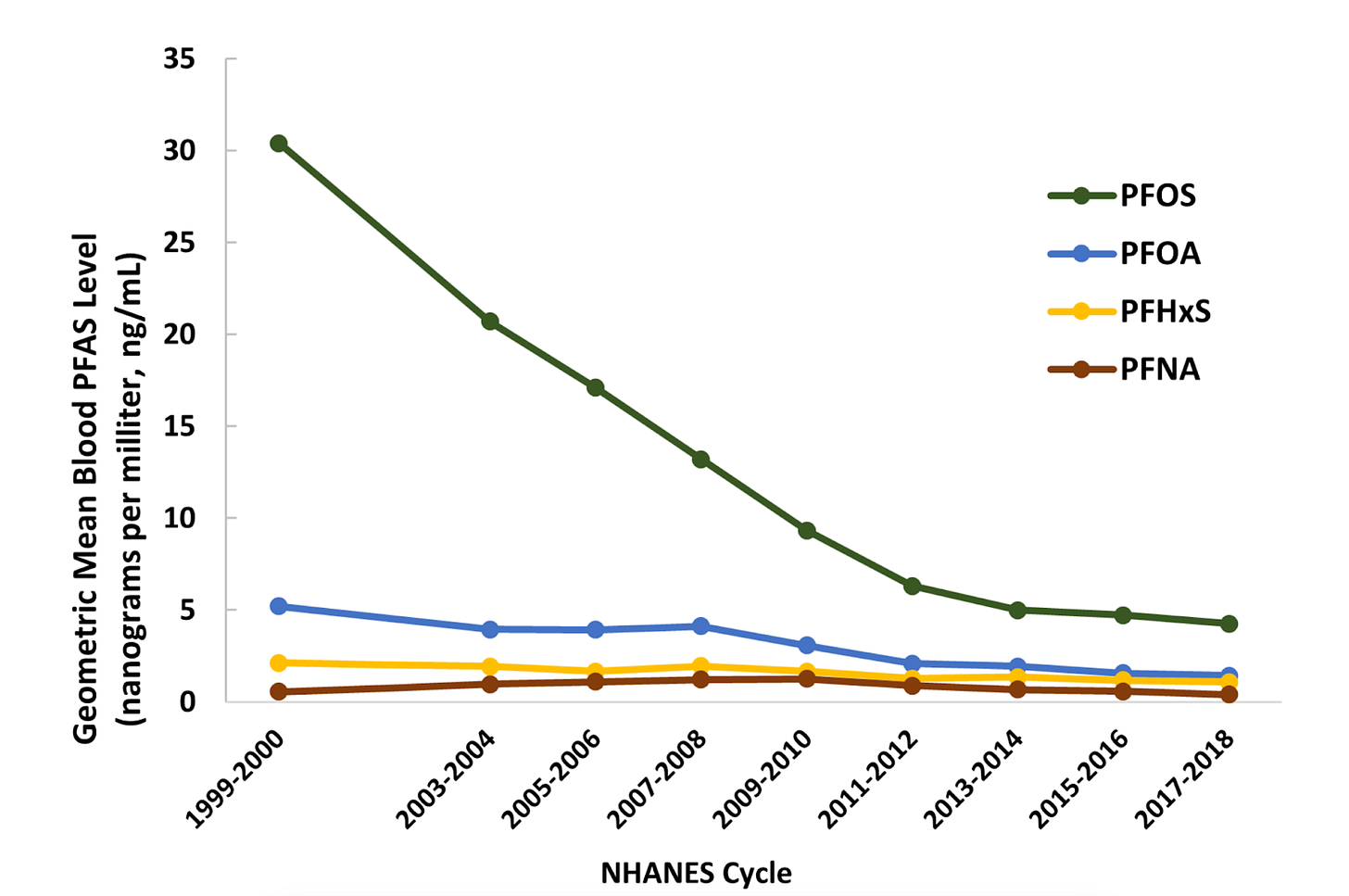Testing your blood for PFAS (“forever chemicals”) is not recommended for most people. However, for the small fraction of people with a history of high PFAS exposure, the potential benefits of testing may outweigh the harms. PFAS blood tests can flag unusually high blood levels of these chemicals or offer peace of mind, but they have major limitations: they don’t guide treatment or predict future health issues, are difficult to interpret, and can cause extra stress.
PFAS (per- and polyfluoroalkyl substances) are a group of persistent “forever chemicals” used to make products that resist heat, water, and grease. They’re in non-stick cookware (e.g.Teflon), textiles (e.g. Scotchgard), food packaging, firefighting foams, cosmetics, and much more. The PFAS family includes thousands of chemicals that each have unique applications and safety profiles.
You may recognize PFAS from news about the US EPA’s new limits on drinking water or stories about industry cover ups of potential health effects. As discussed in previous posts, these chemicals may contribute to health concerns in high-risk populations, but for most people, their impact is likely subtle at best. The health risks posed by each PFAS is impossible to pinpoint, because researchers rely on observational studies (do people with more exposure have more health issues?), which can’t prove cause-and-effect relationships due to confounding.
A PFAS/PFOS blood test measures levels of several chemicals in this family. Since PFAS can persist in our bodies for years, the levels in your body paint a picture of your exposure over several years. Like all medical tests, PFAS blood tests have potential benefits and potential harms that vary from person to person.
The potential benefits of PFAS blood tests include:
- Information that guides exposure reduction. PFAS blood test results can tell you how your PFAS levels compare to the general population. If elevated, this may spur you to identify exposure sources and reduce exposure (e.g. installing a home water filter system that removes PFAS).
- Peace of mind. When test results come back normal (on par with national averages), this can offer mental relief.
The potential limitations and harms of PFAS tests include:
- Clinical uncertainty. PFAS blood test results do not predict future health outcomes. The relationships between blood levels of each PFAS and health effects are not well understood and even the highest risk populations have modest changes to disease risk. It’s definitely not as simple as “elevated PFAS levels predict disease X”. Also, these tests are difficult to compare across labs.
- Unclear sources. PFAS blood tests don’t tell you your exposure sources. Our PFAS blood levels reflect exposures from many different sources over several years.
- Lack of treatment. There is no treatment to remove PFAS from the body. The best thing to do is minimize future exposure.
- Stress. There is a very real risk of causing stress due to results that are difficult to make sense of and don’t guide treatment.
- Incomplete information. These tests only test a small fraction of the potential PFAS we are exposed to.
- Resources. PFAS tests take time, money, and a blood draw which can cause anxiety or even a small injury.
For most people, these tests may do more harm than good. You’ll likely find out that you have some amount of PFAS in your blood, but without a clear understanding of what this means. You may wonder if it was worth spending time and money for ambiguous information and no clear course of action.
The benefits of PFAS blood testing are most likely to outweigh the risks in people with a history of high PFAS exposure, Relevant experts including the US National Academies of Sciences, Engineering, and Medicine recommend that testing should be made available to people in this group, including:
- People with occupational exposure to PFAS
- People who live in communities with documented PFAS contamination
- People who live in communities that are likely to have PFAS contamination (e.g. near a factory)
PFAS blood tests can also be useful to researchers who use them to monitor PFAS levels in various communities and study the health effects of PFAS exposure. The benefit versus risk balance of PFAS testing is much more favorable in this context.
For what it’s worth, none of those Nerdy Girls have chosen to take a PFAS blood test but some are taking action to reduce exposure by installing PFAS water filters if they live in an area with elevated PFAS levels.
If you’re unsure about testing, try this PFAS blood level estimation tool [archived link], talk to your clinician, and consider getting a routine health screen. Routine health exams will detect many of the concerns associated with PFAS exposure and support your overall health.
We’ll leave you with a piece of good news: your body’s PFAS levels are likely headed in the right direction. Thanks to industry regulations, there has been a steady decrease in PFAS blood levels over the past 20 years (e.g. United States, Canada, Australia).

Average PFAS Blood Levels in the United States General Population from NHANES. Source: US CDC ATSDR
Stay safe, stay well,
Those Nerdy Girls
Related Posts
- How do PFAS (forever chemicals) affect my health?
- Who is most exposed to PFAS (forever chemicals)?
- Should I get a water filter to remove PFAS from my water? Which type is best?
Other resources


